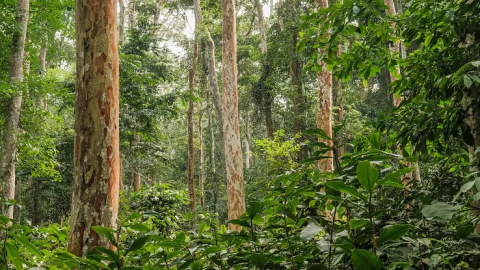Global Recovery From COVID-19 Rooted In Forests, Says New Report
African News, Latest Headlines Tuesday, May 3rd, 2022
(AFRICAN EXAMINER) – Trees and forests can help the world recover from the COVID-19 pandemic and its related economic aftershocks, in addition to combating climate change and biodiversity loss, a new report has revealed.
Current estimates indicate that more than half of world’s gross domestic product which stood at $84.4 trillion in 2020, is dependent upon ecosystem services, including those provided by forests.
The report tagged, “2022 State of the World’s Forests (SOFO)”, was launched by the U.N. Food and Agriculture Organization (FAO) to coincide with the World Forestry Congress in Seoul happening this week from 2-6 May.
This flagship report is updated every two years based on the latest forestry research and data, and several scientists from the Center for International Forestry Research and World Agroforestry (CIFOR-ICRAF) were among its contributing authors.
The SOFO comes just days after startling deforestation figures for 2021 were released via the Global Forest Watch. From the Brazilian Amazon to the Congo basin, the tropics lost 11.1 million hectares of tree cover last year, including 3.75 million ha of primary forest.
CIFOR-ICRAF, which conducts research on forestry and agroforestry in developing countries to inform policy across Asia, Africa, and Latin America, has operating offices in the Democratic Republic of Congo (DRC), Indonesia, Brazil and Peru, and is closely monitoring these trends.
Principal scientist for CIFOR-ICRAF and Lead for Peru, Manuel Guariguata said the capacity of tropical countries to address forest conservation may have been undermined by the COVID-19 pandemic.
“During 2020, the total area deforested across the global tropics doubled with respect to pre-COVID-19 values the year before. Shutdowns and public health concerns pushed the political priorities away from forests and trees”, he said.
Similarly, CIFOR-ICRAF’s Director for Latin America, Vincent Gitz noted that the pandemic has underscored the need for creating shorter supply chains and more diverse and resilient systems.
“To this end, we are working in the Brazilian state of Para with project partners Amazon and the Nature Conservancy, as well as local communities, in our ‘Agroforestry and Restoration Accelerator Project’ to establish diversified agroforestry systems on degraded land and to cultivate markets for sustainable forest-based commodities”, he added.
In particular, the SOFO harped on halting deforestation as a key pathway and sets out how maintaining forests could avoid significant greenhouse-gas emissions – about 14 percent of the reduction needed up to 2030 to keep planetary warming below 1.5 degrees Celsius.
By restoring degraded lands and expanding agroforestry, 1.5 billion hectares of degraded land, an area twice the size of Australia would benefit from restoration and increasing tree cover could boost agricultural productivity on another 1 billion hectares.
Moreover, sustainably using forests and building green value chains would help meet future demand for materials – with global consumption of all natural resources expected to more than double from 92 billion tons 2017 to 190 billion tons in 2060, driven by the projected growth of the global population to 9.8 billion people by 2050.
The organization’s Managing Director, Robert Nasi said although this latest report isn’t startling with regard to research, it details a course of action long promoted by CIFOR-ICRAF by providing a financial roadmap for policymakers and the private sector to follow.
Meanwhile, the total financing to halt deforestation, restore degraded land and build sustainable value chains must triple by 2030 and increase fourfold by 2050 to meet climate, biodiversity and land degradation neutrality targets, with the estimated required finance for forest establishment and management alone equalling $203 billion a year by 2050.
Emphasis was also placed on the role of Indigenous and local communities with a view to giving them the attention they truly deserve in the narrative. For instance, in the Amazonian context, almost half of the intact or primary forest cover across the Amazon Basin falls within formally recognized, indigenous lands.
In fact, smallholder farmers, local communities and Indigenous Peoples own or manage at least 4.35 billion ha of forest and farmlands. Studies show that 91 percent of all indigenous and community lands are in good or moderate ecological condition, indicating great potential to cost-effectively reduce deforestation, according to the report.
The report further disclosed that smallholder farmers produce almost 80 percent of the world’s food. Yet less than 2 percent of global climate finance is reaching smallholders, Indigenous Peoples and local communities in developing countries.
Nasi observed that despite the general squeeze placed on forest-dependent Indigenous Peoples, local and low-income communities, they have no shortage of money. “Governments are estimated to spend $1.8 trillion a year in military expenditures and more than $5 trillion in fossil fuel subsidies, but only about $50 billion on landscape restoration. It’s time for society to rethink our priorities to enable a better future”, he stressed.
CIFOR-ICRAF Senior Scientist and Lead for DRC, Paolo Cerutti said: “In general, it’s not the technical solutions we are missing; but the set of incentives currently in place. In countries that are extremely poor, like the DRC, the question remains: ‘How do you ensure incentives, including financial ones, trickle down to the smallholder farmers so they can reduce the environmental impact from activities that they need to conduct for their basic survival, like cutting down trees for fuelwood?”
CIFOR-ICRAF scientists will be presenting their latest research at the World Forestry Congress this week to discuss the state and future of world forestry trends.
Related Posts
Short URL: https://www.africanexaminer.com/?p=76433






















